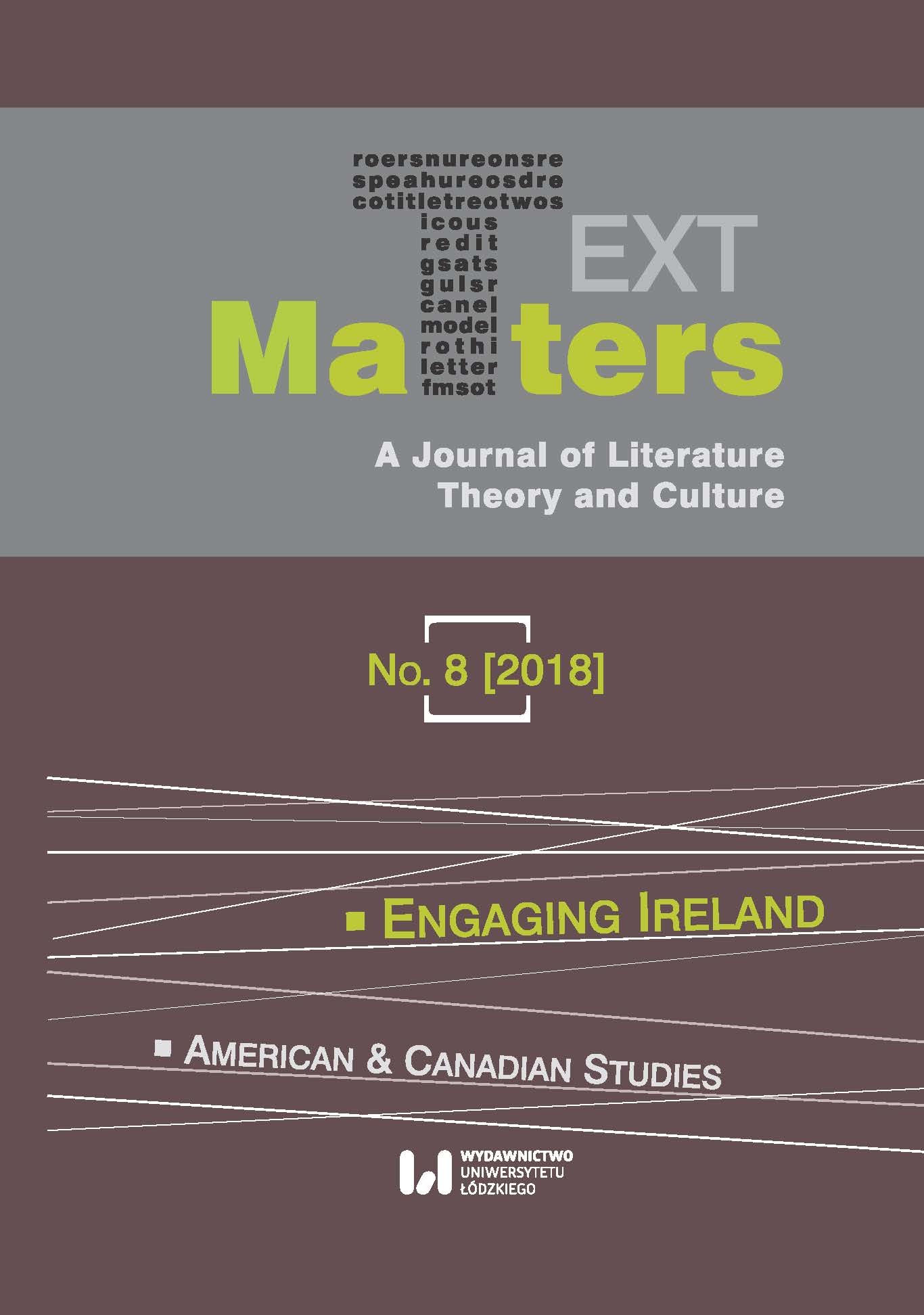Blindness in the Beckettland of Malfunctioning
DOI:
https://doi.org/10.1515/texmat-2018-0008Keywords:
Beckett, drama, blindnessAbstract
Many of Beckett characters suffer from different kinds of disabilities and impairments, this being one of the ways of punishing them for “the eternal sin of having been born.” The article discusses blindness in Waiting for Godot, Endgame and All That Fall. In the first of these plays blindness afflicts Pozzo during the interval between the two acts, that is during a single night. Combined with the loss of his watch it is indicative of his entering the subjective realm of timelessness. The blindness of Hamm in Endgame and his inability to walk make him dependant on Clov who is unable to sit, which recalls Pozzo’s dependence on Lucky in the second act. Similarly, the blind Mr Rooney also must get help from other people to be able to move around. In the case of all three plays blindness must be perceived on a literal, as well as metaphorical level.
Downloads
References
Bair, Deirdre. Samuel Beckett. A Biography. New York and London: Harcourt, 1980. Print.
Google Scholar
Beckett, Samuel. “All That Fall.” Collected Shorter Plays of Samuel Beckett. London: Faber, 1984. 9–39. Print.
Google Scholar
Beckett, Samuel. Endgame. London: Faber, 1970. Print.
Google Scholar
Beckett, Samuel. More Pricks than Kicks. New York: Grove, 1970. Print.
Google Scholar
Beckett, Samuel. Proust and Three Dialogues with George Duthuit. London: John Calder, 1987. Print.
Google Scholar
Beckett, Samuel. Waiting for Godot. London: Faber, 1969. Print.
Google Scholar
Behera, Guru Charan. “Disabling the Disabled: Samuel Beckett and the Plight of the Handicapped.” Notes on Contemporary Literature 34/35 (2004): 13–16. Print.
Google Scholar
Eliot, T. S. “The Hollow Men.” The Complete Poems and Plays of T. S. Eliot. London: Faber, 1970. 83–86. Print.
Google Scholar
Gilman Richard. The Making of Modern Drama. New York: Farrar, 1974. Print.
Google Scholar
Hasselbach, Hans Peter. “Samuel Beckett’s Endgame: A Structural Analysis.” Modern Drama 19.1 (1976): 25–34. Print.
Google Scholar
Hayman, Ronald. Samuel Beckett. London: Heinemann, 1970. Print.
Google Scholar
Harvey, Lawrence E. “Art and the Existential in Waiting for Godot.” Casebook on “Waiting for Godot.” Ed. Ruby Cohn. New York: Grove, 1967. 144–54. Print.
Google Scholar
Knowlson, James. Damned to Fame. The Life of Samuel Beckett. New York: Simon, 1996. Print.
Google Scholar
Lee, Vera G. “Beckett on Proust.” Romantic Review 69 (1978): 196–206. Print.
Google Scholar
Mercier, Vivian. “The Mathematical Limit.” The Nation 14 Feb. 1958: 144– 45. Print.
Google Scholar
Shenker, Israel. “Moody Man of Letters.” The New York Times 6 May 1956: sec. 2: 1 and 3. Print.
Google Scholar
Steward, Paul. Sex and Aesthetics in Samuel Beckett’s Work. New York: Palgrave Macmillan, 2011. Print.
Google Scholar
Torrance, Robert M. “Modes of Being and Time in the World of Godot.” Modern Language Quarterly 28 (1967): 77–95. Print.
Google Scholar
Uchman, Jadwiga. “In a World Characterized by Transience and Doomed to Extinction Some Old Women Still Need Love—Mrs Rooney from Samuel Beckett’s All That Fall.” Text Matters. A Journal of Literature, Theory and Culture 3 (2013): 105–20. Print.
Google Scholar
Uchman, Jadwiga. The Problem of Time in Samuel Beckett’s Drama. Łódź: Wydawnictwo Uniwersytetu Łódzkiego, 1987. Print.
Google Scholar
White, Kathryn. Beckett and Decay. London: Continuum, 2009. Print.
Google Scholar
Downloads
Published
How to Cite
Issue
Section
License
Copyright (c) 2018 A Journal of Literature, Theory and Culture

This work is licensed under a Creative Commons Attribution-NonCommercial-NoDerivatives 4.0 International License.













